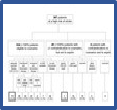Predictors for guideline-nonadherence with antithrombotic therapy in outpatients with chronic atrial fibrillation
Napovedniki antitrombotične terapije pri ambulantnih bolnikih s kronično atrijsko fibrilacijo, ki odstopa od smernic zdravljenja
Abstract
Purpose: Our aims were to determine the prevalence of physicians’ adherence to antithrombotic guidelines in the management of outpatients with chronic atrial fibrillation (AF) and to identify risk factors for nonadherence to treatment guidelines.
Methods: Data on drug treatment, stroke risk factors and psychosocial variables were analyzed descriptively in a cross-sectional communitybased multicentre study. Predictors for nonadherence with guidelines for antithrombotic prophylaxis of AF patients were identified using logistic regression.
Results: Of 413 outpatients with chronic AF attending the offices of family physicians, 184 (44.6%) were treated according to the American College of Chest Physicians (ACCP) 2001 guidelines. In the group of patients with a high risk of stroke (n=387), 178 patients (46.0%) received guideline-adherent treatment. 31 of the high-risk patients received coumarin although they had at least one contraindication. Multivariate analysis showed the presence of absolute contraindications to coumarins to be an independent predictor of guidelinenonadherent treatment.
Conclusion: To improve guideline-adherence in the antithrombotic treatment in AF outpatients, strategies involving individual assessment of the risks and benefits will need to be established and implemented.
Downloads

Copyright (c) 2009 Acta Medico-Biotechnica

This work is licensed under a Creative Commons Attribution 4.0 International License.